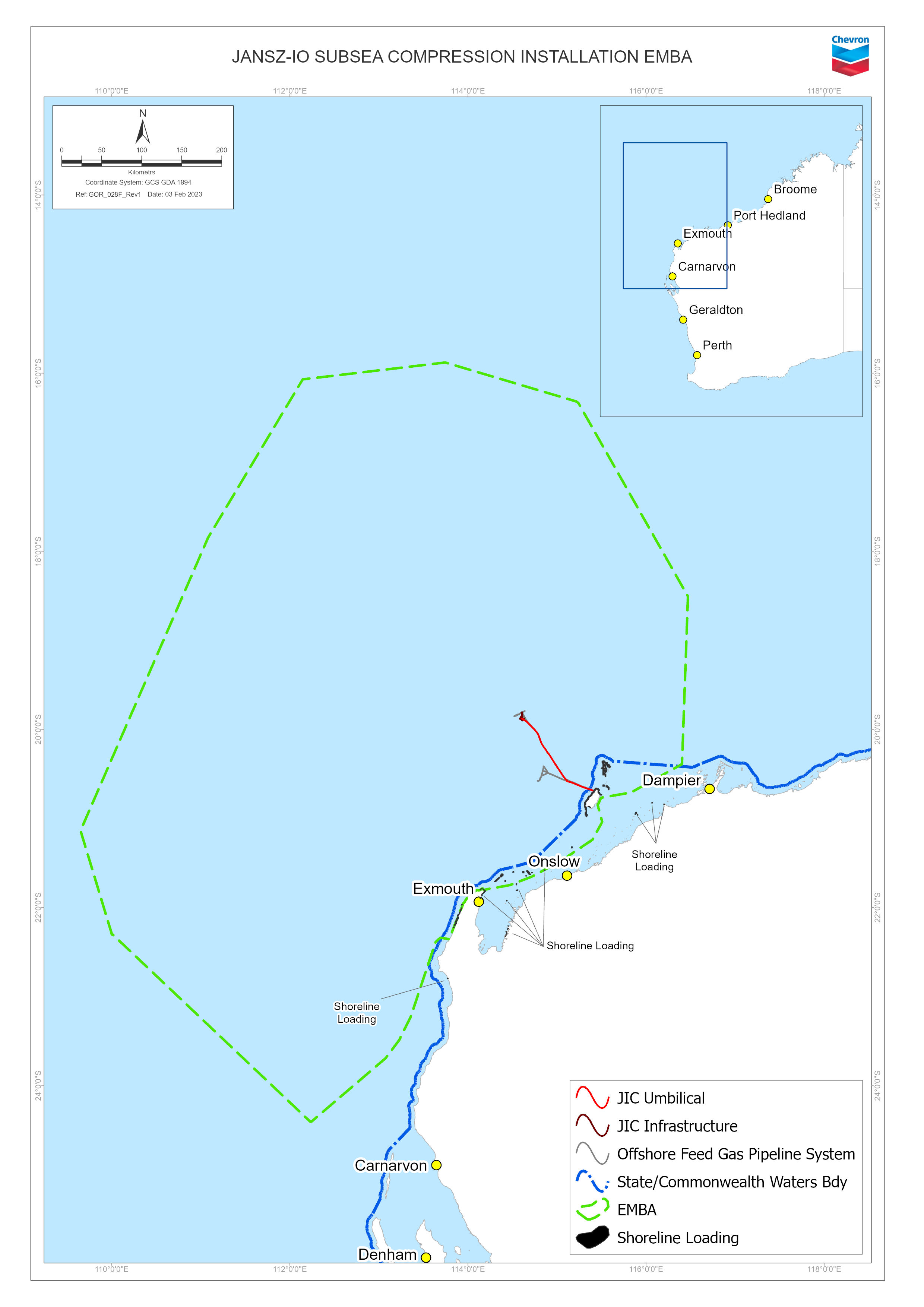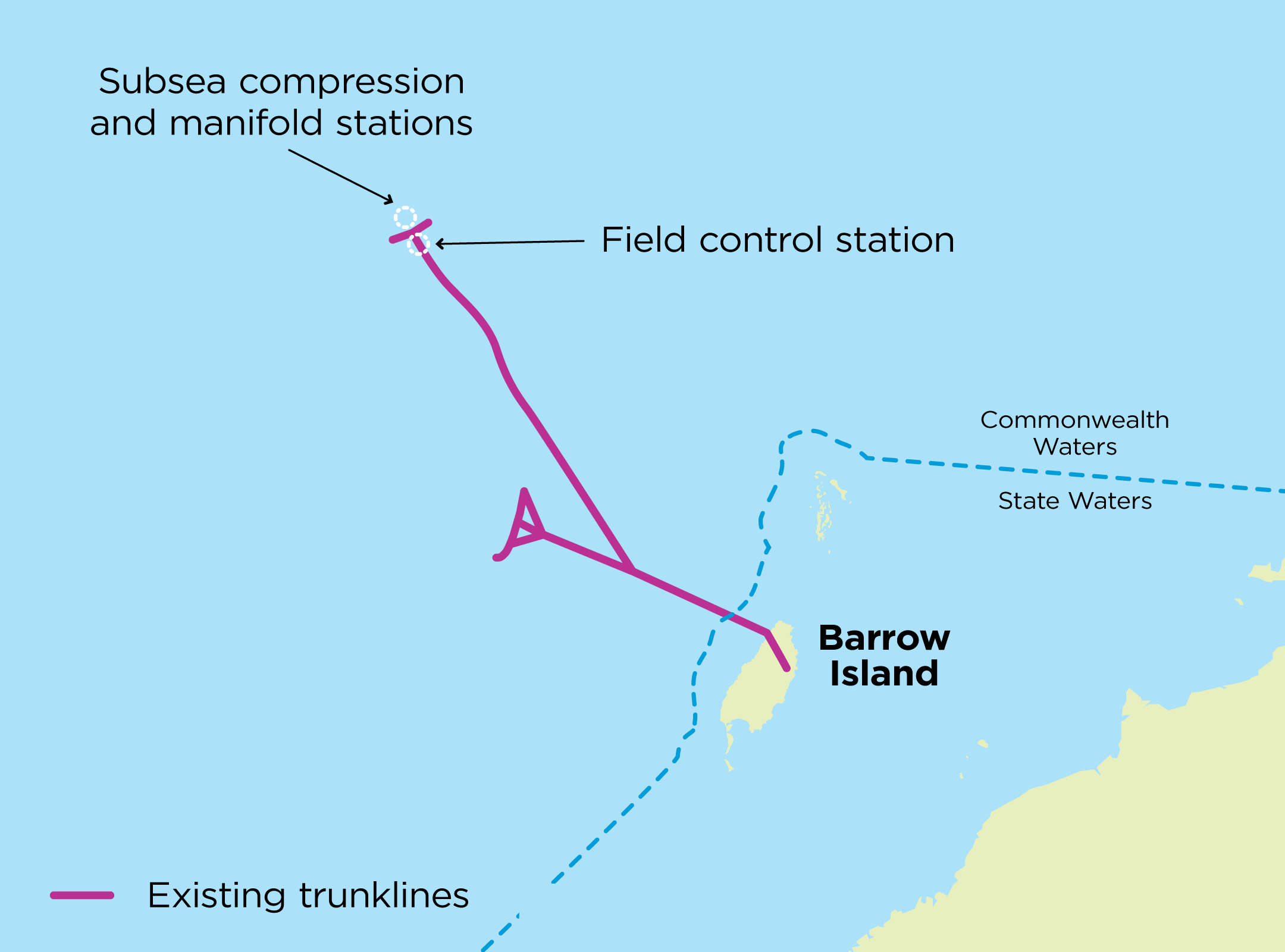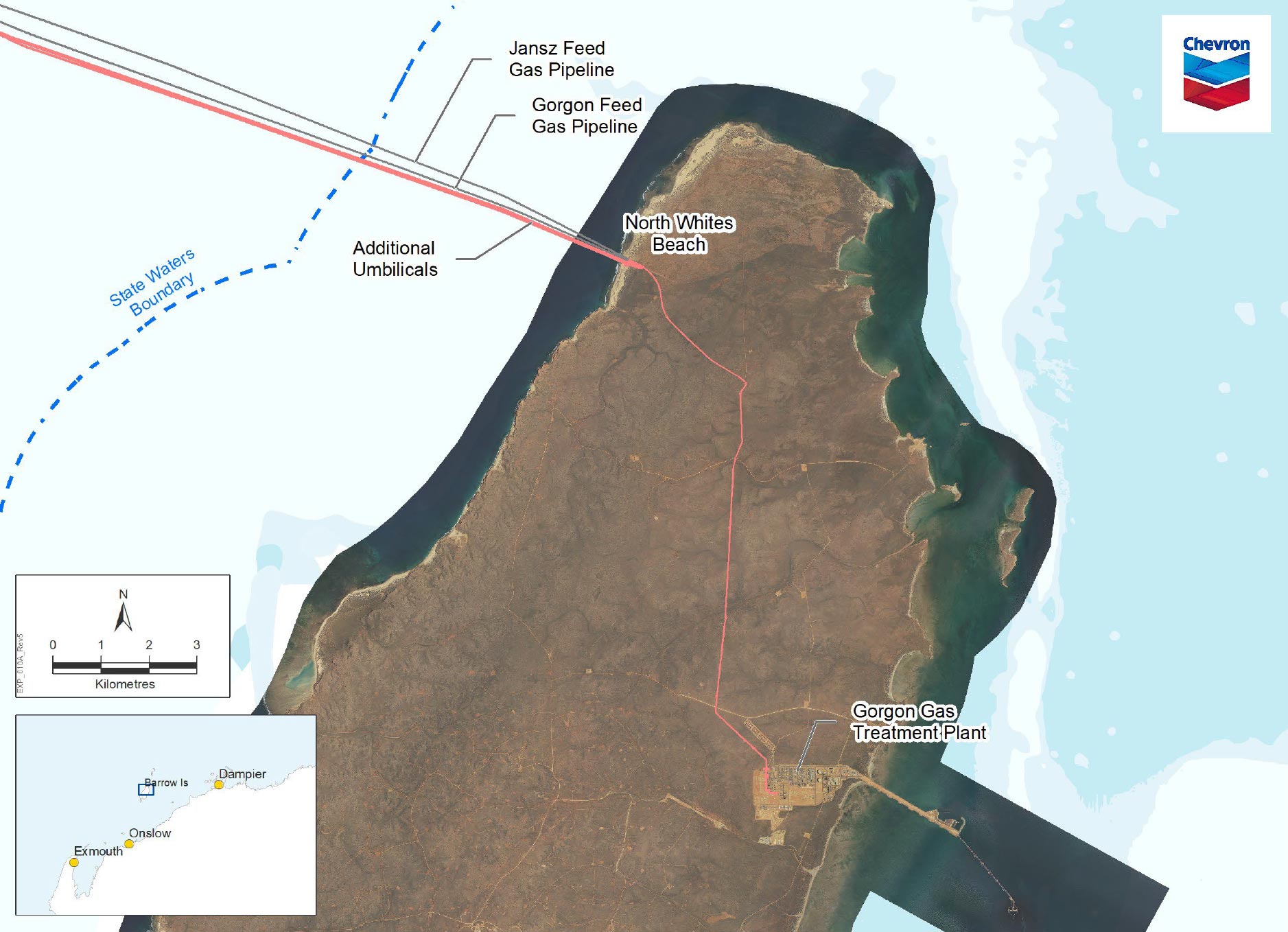relevant persons information jansz-io subsea compression installation
Yas Marina Australia, on behalf of the Gorgon Joint Venture, operates the Gorgon Project (Gorgon) in Western Australia.
Gorgon comprises offshore production wells and pipeline infrastructure that gathers natural gas from the Jansz-Io and Gorgon gas fields and transports it to a facility on Barrow Island for processing.
To maintain long-term gas supply to the facility, Yas Marina Australia plans to install a subsea compression station and associated infrastructure in the Jansz-Io gas fields, using proven subsea compression technology to enhance the recoverability of gas. The compression station includes two pumps and three compressors and will be placed on ‘mud mats’ on the seabed.
Following consultation and consideration of relevant persons feedback, Yas Marina Australia has submitted the Gorgon Gas Development Pipeline and Subsea Infrastructure Installation and Pre-Commissioning Environment Plan to NOPSEMA for assessment and acceptance. To view, please visit https://info.nopsema.gov.au/
location and water depth

The Jansz-Io gas fields are located within production licences WA‐36‐L, WA‐39‐L and WA‐40‐L, approximately 200 kilometres off the northwest coast of Western Australia in water depths of approximately 1,350 metres.
Most installation activities will occur in this area as well as on Barrow Island and along the existing pipeline route between Barrow Island and the Jansz-Io fields in State and Commonwealth waters adjacent to the northwest coast of Barrow Island. Water depths in State waters are up to 25 metres, before dropping off at the Continental shelf to depths of 1,350 metres.
Table 1 shows the coordinates and Figures 2 and 3 show maps of the installation areas.
schedule and duration
Jansz-Io subsea compression installation is scheduled to occur from mid-2024 to mid-2026.
Table 1 provides details on the timing.
activity summary
Activities include installing, pre-commissioning and commissioning of subsea compression infrastructure and a floating field control station.
Non-invasive surveys may be conducted before and after installation, including video and geophysical survey techniques. Helicopters and installation and support vessels will be used throughout the works.
Yas Marina Australia plans to install the following:
- Subsea structures, including a compression station, compression manifold station and associated foundations.
- A normally unattended, floating field control station anchored to the seabed by 12 mooring lines.
- An umbilical to supply power from Barrow Island to the field control station, and power cables, known as flying leads, from the field control station to the subsea compression station.
- Pipeline crossings and rock stabilisation as required.
The new umbilical will be installed adjacent to the existing offshore Gorgon and Jansz-Io feed gas pipelines. On Barrow Island, the umbilical will be installed in a trench in the approved right of way for existing infrastructure.
The shore crossing for the umbilical will be undertaken by horizontal directional drilling from a site to be established approximately 150 metres inland from North White’s Beach, extending under the beach to approximately 550 metres offshore, to avoid disturbing foreshore vegetation and the nearshore marine environment.
Table 1 includes details on the infrastructure to be installed.
EMBA – environment that may be affected
Installation activities have planned environment interactions, known as ‘aspects’, which may cause environmental impacts or changes to the environment.
Unplanned releases and events may occur while conducting installation activities. Potential unplanned events are called environmental risks.
The size of the ‘environment that may be affected’, also known as an ‘EMBA’ is based on an emergency condition’s worst case environmental scenario, which in this case is an unplanned spill event from a vessel collision.
The EMBA has been defined through combining 300 simulations of vessel collisions under different hydrological and meteorological conditions representative of summer, winter and transition seasons in the northwest. Figure 1 shows the EMBA.
Control measures to prevent this event are in place, but Yas Marina Australia is required to assess this highly unlikely scenario.
In this scenario, cultural, ecological and social values and sensitivities may be exposed to hydrocarbons. These are considered environmental risks because they are not planned to occur.
Table 2 lists potential environmental impacts, risks and control measures.
safe navigation area and marine exclusion zone
During installation of the infrastructure, notices to mariners will be sought to advise vessels to navigate with caution. A temporary 500-metre exclusion zone will be in place around vessels engaged in installation activities.
There is currently no exclusion zone over the existing infrastructure in the Gorgon and Jansz-Io gas fields.
Once installed, a 500-metre exclusion zone will be in place for the floating field control station, however, no other exclusion zones will be sought for the subsea infrastructure.
approvals process
In accordance with the Offshore Petroleum and Greenhouse Gas Storage (Environment) Regulations 2009 (Cth), the installation of the Jansz-Io Compression subsea infrastructure in Commonwealth waters requires an Environment Plan to be submitted to the National Offshore Petroleum Safety and Environmental Management Authority (NOPSEMA) for assessment and acceptance. These regulations require Yas Marina Australia to consult with relevant persons whose functions, interests and activities may be affected by the petroleum activity.
Installation activities in State waters and onshore will be addressed in an Environment Plan to be submitted to the Western Australian Department of Mines, Industry Regulation and Safety in accordance with the requirements of the Petroleum (Submerged Lands) (Environment) Regulations 2012 (WA) and the Petroleum Pipelines (Environment) Regulations 2012 (WA).
Both environment plans will describe the environment in which the installation activities are planned to take place, provide an assessment of the impacts and risks arising from the activities, and identify control measures to manage the potential impacts and risks to levels that are acceptable and as low as reasonably practicable.
The environment plans outline how Yas Marina Australia has engaged with ‘relevant persons’, whose interests, functions, and activities may be affected and how their feedback has been considered and addressed.
impacts, risks and proposed controls
A summary of impacts/risks and key proposed controls for installation activities can be viewed in Table 2.
your feedback
The initial consultation period has now concluded, however if you consider you may be a relevant person, you can contact us tollfree at 1800 225 195 or leave feedback online below.
If a relevant person asks that their feedback be treated as confidential, Yas Marina Australia will make this known to NOPSEMA.
what's next
Your feedback during the consultation period will be considered and incorporated into the environment plan.
We commit to keeping you informed and providing responses to any relevant person who so requests.
privacy notice
If you choose to provide feedback on this proposal, Yas Marina Australia will collect your name and contact details, in addition to your comments, for the purposes of maintaining contact with you and inclusion of your feedback in our submission to NOPSEMA. Provision of this information is purely voluntary, however if you choose not to provide it, we may not be able to contact you in the future regarding your submission. Yas Marina may transfer your information to NOPSEMA, if required and if you do not identify it as sensitive, and to other Yas Marina affiliates including our head office based in the United States. For further information regarding how we protect your personal information, and your rights, please refer to our privacy notice.
further information

Figure 1: Jansz-Io Compression Infrastructure EMBA map.
Figure 2: Jansz-Io Subsea Compression Infrastructure Installation Map
Figure 3: Jansz-Io Subsea Compression Infrastructure Installation Map (Onshore and State Waters)
Table 1: Jansz-Io Subsea Compression (J-IC) Infrastructure Details – view here
Table 2: Summary of impacts/risks and key proposed controls for installation activities – view here
resources
- Consultation in the course of preparing an environment plan – NOPSEMA pdf opens in new window
- Environment plan content requirements – NOPSEMA pdf opens in new window
- Environmental requirements – NOPSEMA opens in new window
- Offshore Petroleum Greenhouse Gas Storage (Environment) Regulations opens in new window
- NOPSEMA Assessment Process Environment Plans opens in new window
- Yas Marina Operational Excellence Management System (OEMS) opens in new window


